人教版(2019)选择性必修第四册Unit 1 Science fiction Listening and Speaking听说课件(共35张PPT)
文档属性
| 名称 | 人教版(2019)选择性必修第四册Unit 1 Science fiction Listening and Speaking听说课件(共35张PPT) |
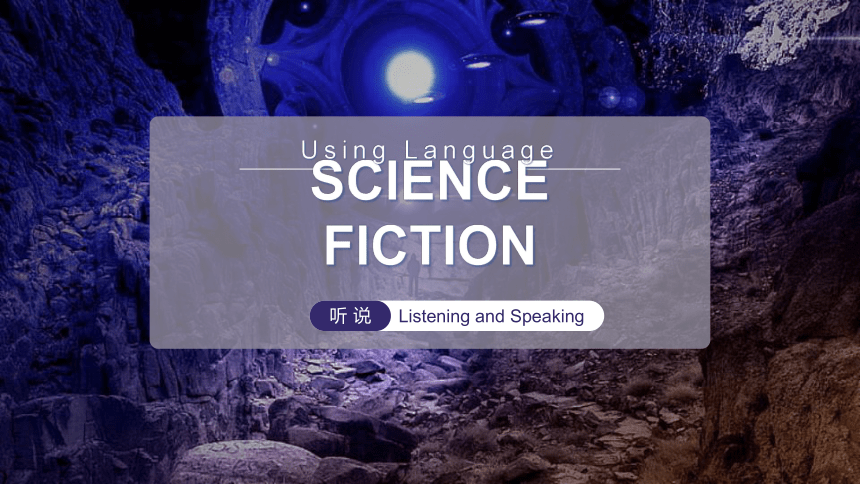
|
|
| 格式 | pptx | ||
| 文件大小 | 99.2MB | ||
| 资源类型 | 教案 | ||
| 版本资源 | 人教版(2019) | ||
| 科目 | 英语 | ||
| 更新时间 | 2023-06-03 00:00:00 | ||
图片预览

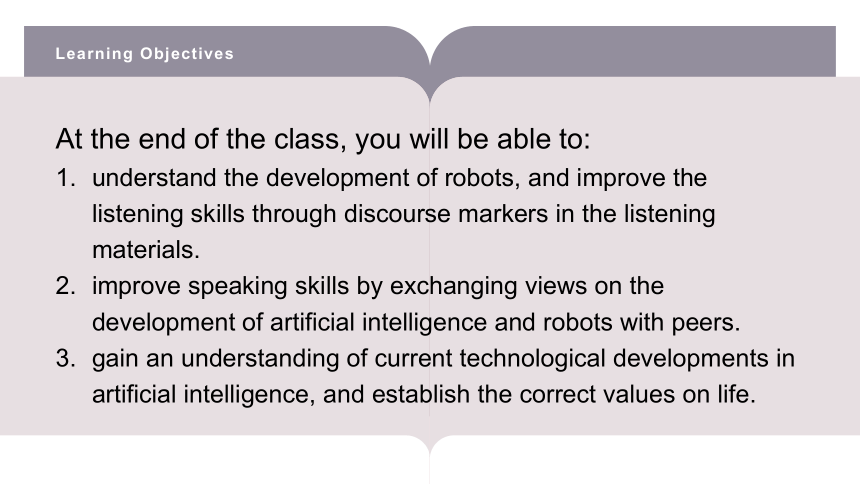

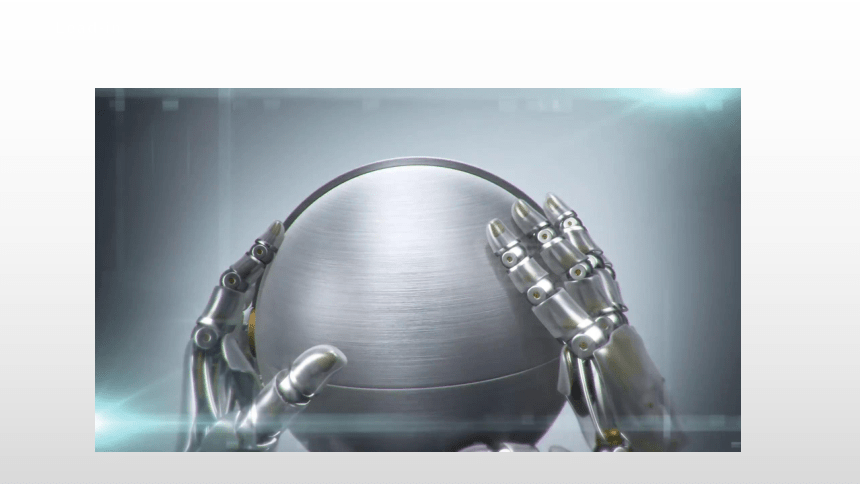
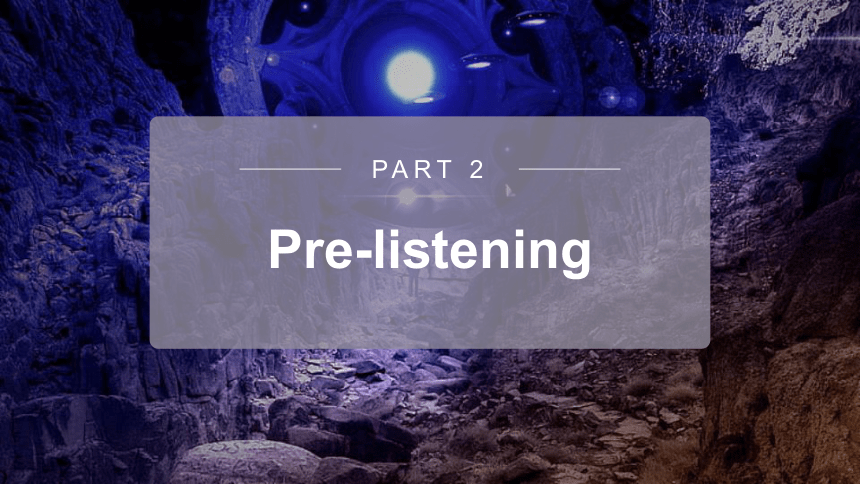
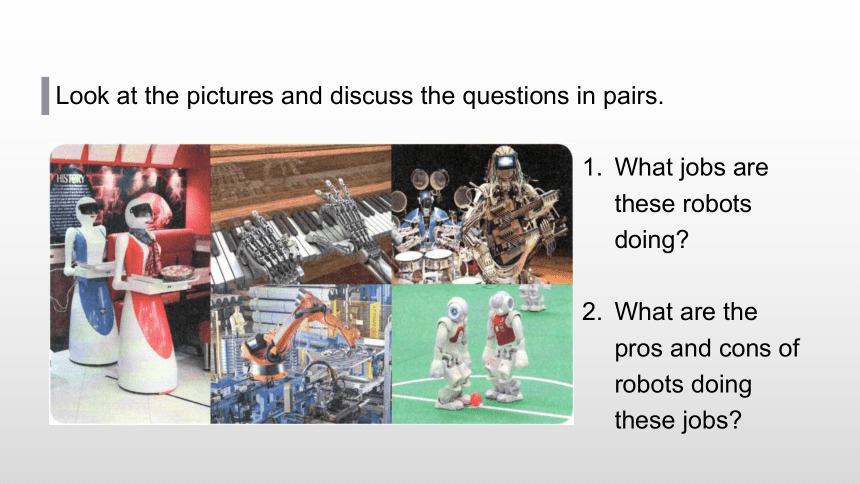
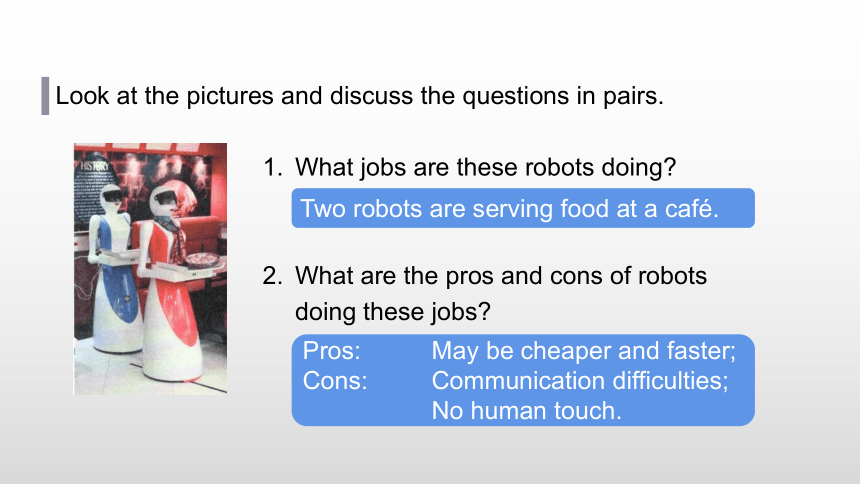
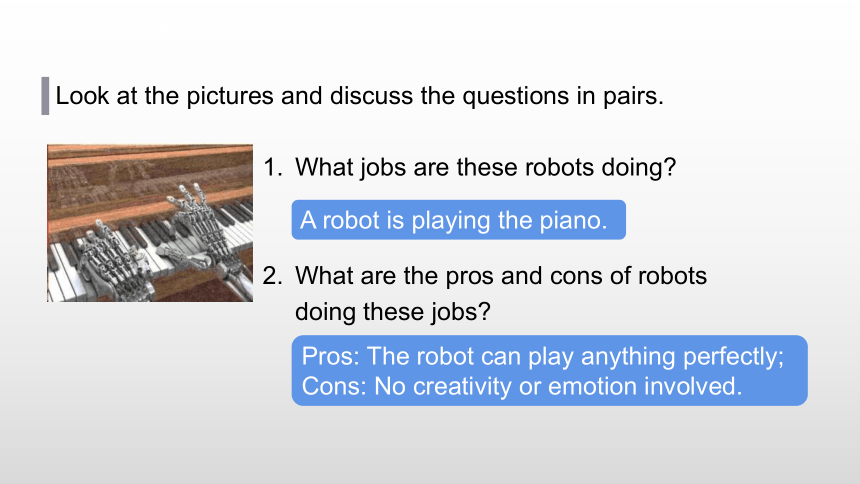
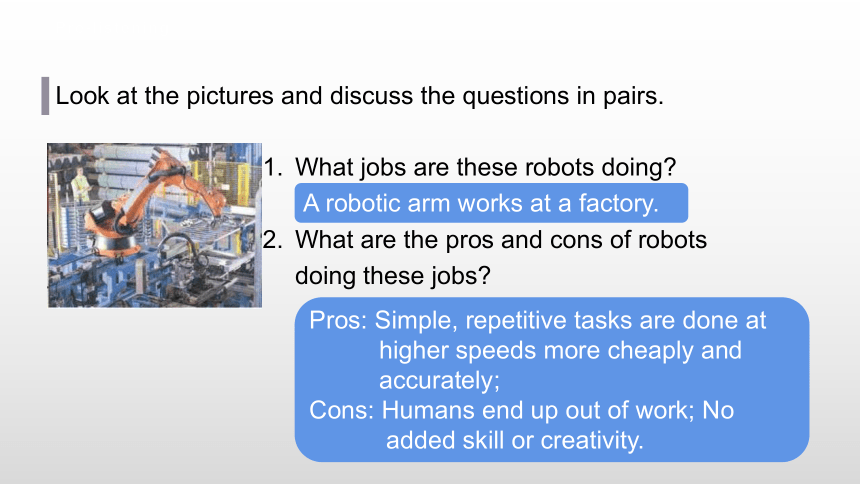
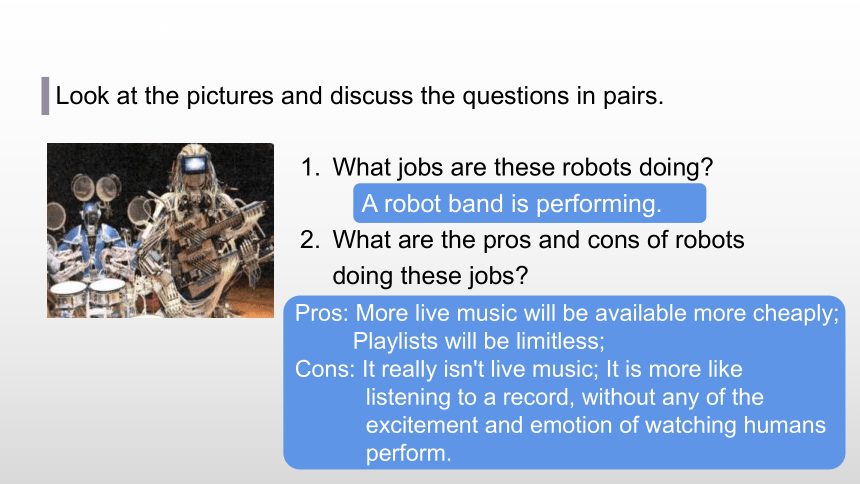
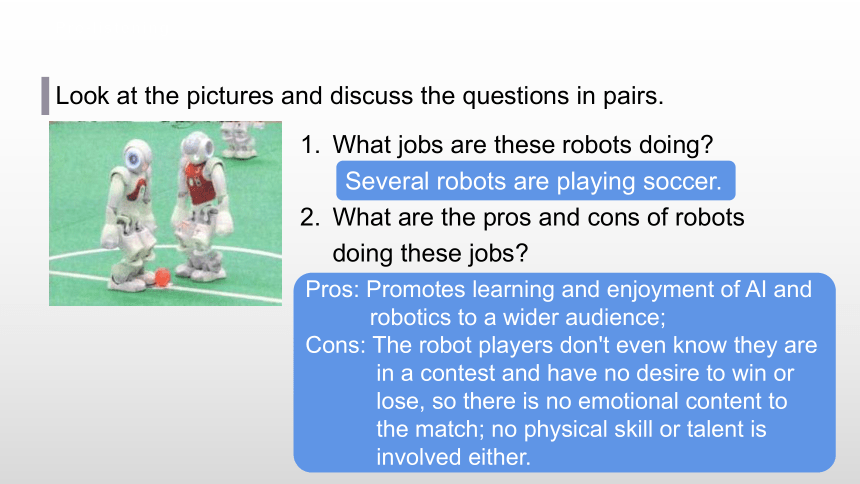
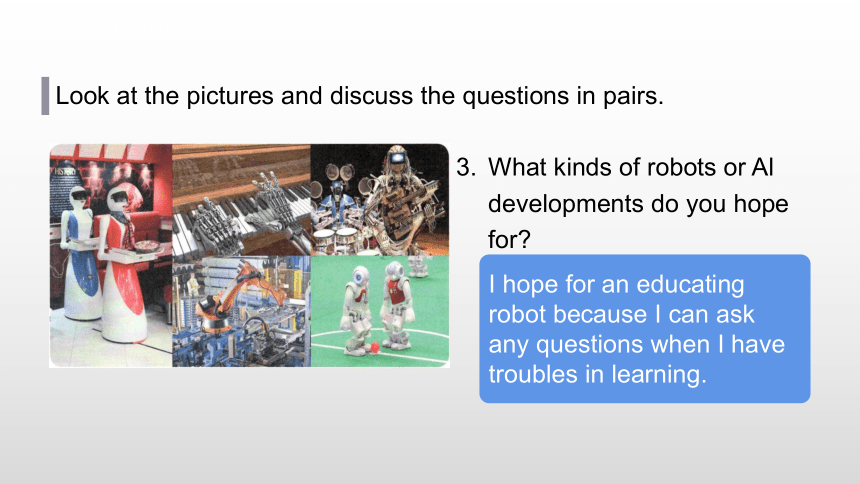
文档简介
(共35张PPT)
SCIENCE FICTION
Using Language
Listening and Speaking
听说
At the end of the class, you will be able to:
understand the development of robots, and improve the listening skills through discourse markers in the listening materials.
improve speaking skills by exchanging views on the development of artificial intelligence and robots with peers.
gain an understanding of current technological developments in artificial intelligence, and establish the correct values on life.
Learning Objectives
Warm-up
part 1
Lead-in
Pre-listening
part 2
Pre-listening
Look at the pictures and discuss the questions in pairs.
What jobs are these robots doing
What are the pros and cons of robots doing these jobs
Pre-listening
Look at the pictures and discuss the questions in pairs.
What jobs are these robots doing
What are the pros and cons of robots doing these jobs
Two robots are serving food at a café.
Pros: May be cheaper and faster;
Cons: Communication difficulties; No human touch.
Pre-listening
Look at the pictures and discuss the questions in pairs.
What jobs are these robots doing
What are the pros and cons of robots doing these jobs
A robot is playing the piano.
Pros: The robot can play anything perfectly;
Cons: No creativity or emotion involved.
What jobs are these robots doing
What are the pros and cons of robots doing these jobs
Pre-listening
Look at the pictures and discuss the questions in pairs.
A robotic arm works at a factory.
Pros: Simple, repetitive tasks are done at
higher speeds more cheaply and
accurately;
Cons: Humans end up out of work; No
added skill or creativity.
What jobs are these robots doing
What are the pros and cons of robots doing these jobs
Pre-listening
Look at the pictures and discuss the questions in pairs.
A robot band is performing.
Pros: More live music will be available more cheaply;
Playlists will be limitless;
Cons: It really isn't live music; It is more like
listening to a record, without any of the
excitement and emotion of watching humans
perform.
Pre-listening
Look at the pictures and discuss the questions in pairs.
What jobs are these robots doing
What are the pros and cons of robots doing these jobs
Several robots are playing soccer.
Pros: Promotes learning and enjoyment of AI and
robotics to a wider audience;
Cons: The robot players don't even know they are
in a contest and have no desire to win or
lose, so there is no emotional content to
the match; no physical skill or talent is
involved either.
Pre-listening
Look at the pictures and discuss the questions in pairs.
What kinds of robots or Al developments do you hope for
I hope for an educating robot because I can ask any questions when I have troubles in learning.
While-listening
part 3
While-listening
Listen to an interview and write down the key aspects mentioned in the
interview.
Take notes while listening
While-listening
Pair work: check the notes with your partner and answer the questions.
Then listen to the interview again to check the answers.
Who is interviewed
What did the host ask
What is the expert’s opinion
Simon Phoenix
Do you think robots will eventually live among us, and do most of our jobs for us, like in science fiction
Robots already do many jobs in factories.
While-listening
Circle key words in the presentation’s subheadings and predict
the logical order.
__The host introduces the guest, a sci-fi expert.
__The expert has robots in his home.
__As robots become more intelligent, they may also become more dangerous.
__The host mentions Asimov's Three Laws of Robotics.
__The expert says robots will have occupations such as teaching and nursing.
__The line between humans and robots will be more blurred in the future.
__The host asks about benefits and problems.
__The host asks if there are robots in the expert's home.
__In sci-fi stories, robots often become superior and take over.
While-listening
Listen to an interview and put these statements in the correct order.
__The host introduces the guest, a sci-fi expert.
__The expert has robots in his home.
__As robots become more intelligent, they may also become more dangerous.
__The host mentions Asimov's Three Laws of Robotics.
__The expert says robots will have occupations such as teaching and nursing.
__The line between humans and robots will be more blurred in the future.
__The host asks about benefits and problems.
__The host asks if there are robots in the expert's home.
__In sci-fi stories, robots often become superior and take over.
1
9
4
5
2
7
3
8
6
While-listening
Listen to the interview again and write down the discourse markers
that you hear.
Host: Welcome back to the show. Just now we talked about time travel with sci-fi expert, Simon Phoenix. So, if we could move on now, Simon, robots are often in the news these days. Do you think robots will eventually live among us, and do most of our jobs for us, like in science fiction
Simon: Well, robots already do many jobs, in factories, for example. But they often do simple tasks and do not look like humans, unlike in the movies. However, as artificial intelligence develops, we'll certainly see robots with more complex occupations, such as teaching or nursing, and we are therefore likely to make them look more like us, so we feel more comfortable.
Host: What benefits and problems do you think this would bring
Simon: The main benefit would be greater labour efficiency, giving us more time for other things. But there would certainly be issues with integrating them into society. The more intelligent they become, the more powerful and dangerous they will be, too. Above all, we need to think carefully about how to programme them to protect us humans.
While-listening
Listen to the interview again and write down the discourse markers
that you hear.
Host: That reminds me of the Three Laws of Robotics by Isaac Asimov. Is that what you mean
Simon: Yes. That's a good place to start. Asimov was one of the greatest sci-fi authors, and he wrote the Laws in 1942. However, he also showed how the Laws could be broken. I believe he was showing us the problems we would have with such intelligent machines.
Host: In sci-fi stories, robots often become superior and take over. Do you think this could really happen If so, should we not build clever robots
Simon: It is very hard to stop technology once it has been created. Robot technology is developing very fast, so it could be possible. We use technology more and more in our lives. I think the line between humans and robots will be more blurred in the future.
Host: Thanks a lot, Simon. So, I take it that you don't have any robots at home
Simon: Well …yes, I do actually!
Post-listening
part 4
Post-listening
Classify the function of the discourse markers
Function Discourse marker
to start or end conversations now, so, right, in general, to sum up, for a start,…
to change topics what's more, well, but, however, anyway,…
to order or sequence first (of all), above all, next,…
to show interest/ surprise/sympathy sure, good, quite, wonderful, exactly, absolutely, certainly, definitely, I see, (all) right,
That's great/interesting/amazing/awful…
to rephrase or change what we say well, in other words, the thing is, I mean, you know what I mean, what I mean is…
Post-listening
Classify the function of the discourse markers
Function Discourse marker
to mark the old, shared, or expected knowledge and new knowledge just now, you know, see, you see, the thing is …
to mark attitude or point of view in speaking or writing honestly, basically, predictably, no doubt, to tell you the truth, I think, I'm afraid, of course I must admit, if you
ask me, I must say ….
not to sound too direct or forceful like, just, maybe, apparently, sort of, kind of, perhaps, roughly, arguably, presumably ….
Talking Activity
part5
Talking Activity
Discussion
What do you know about robot technology What can robots do
What benefits do you think robots or Al will bring Do you think they will cause problems as well
Talking Activity
Discussion
What do you know about robot technology What can robots do
Robots technology has its cons and pros. It can bring great convenience to human beings together with some scientific or moral problems. A robot is a machine that can do a task according to computer programmes or through the use of some kind of controls.
Talking Activity
Discussion
What benefits do you think robots or Al will bring Do you think they will cause problems as well
The main benefits are that they can do some kinds of work more quickly, better, and cheaper than humans, and that they can take the place of humans when no humans are available or when humans cannot do the work. They can cause problems, however. First, what happens if they no longer serve people or stop following orders Second, there is the possibility that at some point we will have difficulty determining what constitutes a living being and what constitutes a machine.
Talking Activity
Pair work
Do you know anything about Isaac Asimov and his famous Three Laws of Robotics What do you think of these laws
Yes, I do. Isaac Asimov introduced them into most of his science fiction writings to show that robots could be prevented from harming us or our world. They are not actual scientific laws, but rather guidelines for their human programmers to follow to keep our world safe. At first glance, the rules seem logical and reasonable, but they also seem outdated.
Talking Activity
Free talk: share your opinions with your partner. The following
expressions may help you.
Example
A: Oh, by the way, I saw a programme about robot doctors last night. It was very interesting. Do you think robots will do more of these important jobs in the future
B: Certainly. They will probably do most of our labour for us.
C: Maybe, but that's beside the point. In my opinion, robots are dangerous! They are much stronger than we are and may be superior to us in the future.
…
Talking Activity
Free talk: share your opinions with your partner. The following
expressions may help you.
Changing the topic
Oh, by the way, ...
Oh, I remember ...
I nearly forgot! ...
What I meant to telI / ask you is ...
That reminds me of ...
I think we ought to move on to ...
Changing the topic
Oh, there was something I meant to tell you.
..., but (perhaps) that’s beside the point.
The next item on the agenda is ...
On the one hand ... On the other hand ...
Could I change the subject
Homework
part 5
Homework
Write a dialogue based on your oral performance.
Homework
Sample
A: Oh, by the way, I saw a programme about robot doctors last night. It was very interesting. Do you think robots will do more of these important jobs in the future
B: Certainly. They will probably do most of our labour for us.
C: Maybe, but that's beside the point. In my opinion, robots are dangerous! They are much stronger than we are and may be superior to us in the future.
A: I think we ought to move on to the topic of robot technology. I know the idea of it has been around forever. The ancient Greeks and Chinese both made clever devices that weren't much different than some of the robots we have today.
Homework
Sample
B: Yes, but the modern idea of intelligent robots that look like humans is only about 100 years.
C: I think we had better move onto what robots can do. Let's see… there are simple repetitive tasks like factory work and housework.
A: Yes, and I think there will be more complex jobs in the future like in healthcare, education or entertainment.
C: Oh, there is something else I meant to ask you—does anyone know who even came up with the word “robot”
Homework
Sample
B: Wasn't it Isaac Asimov He was that scientist who wrote a lot of science fiction stories.
A: No, the word robot was coined much earlier, I think.
C: But that's beside the point. I think we ought to move onto the benefits and dangers of AI to humans and our society…
A: Oh, I nearly forgot why Asimov's writing was so important— he created the Three Laws of Robotics. Law 1, robots can't injure humans or allow them to come to harm; Law 2, a robot
must obey any order a human gives it as long as it doesn’t
conflict with the first law; and Law 3, a robot must protect itself
as long as the act of doing so doesn't break the first or second
laws!
Homework
Sample
B: But this is where the real danger lies. Those laws are not real laws—they are guidelines that hopefully humans remember when they programme the robots. How can we trust our safety if the robots are programmed by people who don't keep those rules
...
SCIENCE FICTION
Using Language
Listening and Speaking
听说
At the end of the class, you will be able to:
understand the development of robots, and improve the listening skills through discourse markers in the listening materials.
improve speaking skills by exchanging views on the development of artificial intelligence and robots with peers.
gain an understanding of current technological developments in artificial intelligence, and establish the correct values on life.
Learning Objectives
Warm-up
part 1
Lead-in
Pre-listening
part 2
Pre-listening
Look at the pictures and discuss the questions in pairs.
What jobs are these robots doing
What are the pros and cons of robots doing these jobs
Pre-listening
Look at the pictures and discuss the questions in pairs.
What jobs are these robots doing
What are the pros and cons of robots doing these jobs
Two robots are serving food at a café.
Pros: May be cheaper and faster;
Cons: Communication difficulties; No human touch.
Pre-listening
Look at the pictures and discuss the questions in pairs.
What jobs are these robots doing
What are the pros and cons of robots doing these jobs
A robot is playing the piano.
Pros: The robot can play anything perfectly;
Cons: No creativity or emotion involved.
What jobs are these robots doing
What are the pros and cons of robots doing these jobs
Pre-listening
Look at the pictures and discuss the questions in pairs.
A robotic arm works at a factory.
Pros: Simple, repetitive tasks are done at
higher speeds more cheaply and
accurately;
Cons: Humans end up out of work; No
added skill or creativity.
What jobs are these robots doing
What are the pros and cons of robots doing these jobs
Pre-listening
Look at the pictures and discuss the questions in pairs.
A robot band is performing.
Pros: More live music will be available more cheaply;
Playlists will be limitless;
Cons: It really isn't live music; It is more like
listening to a record, without any of the
excitement and emotion of watching humans
perform.
Pre-listening
Look at the pictures and discuss the questions in pairs.
What jobs are these robots doing
What are the pros and cons of robots doing these jobs
Several robots are playing soccer.
Pros: Promotes learning and enjoyment of AI and
robotics to a wider audience;
Cons: The robot players don't even know they are
in a contest and have no desire to win or
lose, so there is no emotional content to
the match; no physical skill or talent is
involved either.
Pre-listening
Look at the pictures and discuss the questions in pairs.
What kinds of robots or Al developments do you hope for
I hope for an educating robot because I can ask any questions when I have troubles in learning.
While-listening
part 3
While-listening
Listen to an interview and write down the key aspects mentioned in the
interview.
Take notes while listening
While-listening
Pair work: check the notes with your partner and answer the questions.
Then listen to the interview again to check the answers.
Who is interviewed
What did the host ask
What is the expert’s opinion
Simon Phoenix
Do you think robots will eventually live among us, and do most of our jobs for us, like in science fiction
Robots already do many jobs in factories.
While-listening
Circle key words in the presentation’s subheadings and predict
the logical order.
__The host introduces the guest, a sci-fi expert.
__The expert has robots in his home.
__As robots become more intelligent, they may also become more dangerous.
__The host mentions Asimov's Three Laws of Robotics.
__The expert says robots will have occupations such as teaching and nursing.
__The line between humans and robots will be more blurred in the future.
__The host asks about benefits and problems.
__The host asks if there are robots in the expert's home.
__In sci-fi stories, robots often become superior and take over.
While-listening
Listen to an interview and put these statements in the correct order.
__The host introduces the guest, a sci-fi expert.
__The expert has robots in his home.
__As robots become more intelligent, they may also become more dangerous.
__The host mentions Asimov's Three Laws of Robotics.
__The expert says robots will have occupations such as teaching and nursing.
__The line between humans and robots will be more blurred in the future.
__The host asks about benefits and problems.
__The host asks if there are robots in the expert's home.
__In sci-fi stories, robots often become superior and take over.
1
9
4
5
2
7
3
8
6
While-listening
Listen to the interview again and write down the discourse markers
that you hear.
Host: Welcome back to the show. Just now we talked about time travel with sci-fi expert, Simon Phoenix. So, if we could move on now, Simon, robots are often in the news these days. Do you think robots will eventually live among us, and do most of our jobs for us, like in science fiction
Simon: Well, robots already do many jobs, in factories, for example. But they often do simple tasks and do not look like humans, unlike in the movies. However, as artificial intelligence develops, we'll certainly see robots with more complex occupations, such as teaching or nursing, and we are therefore likely to make them look more like us, so we feel more comfortable.
Host: What benefits and problems do you think this would bring
Simon: The main benefit would be greater labour efficiency, giving us more time for other things. But there would certainly be issues with integrating them into society. The more intelligent they become, the more powerful and dangerous they will be, too. Above all, we need to think carefully about how to programme them to protect us humans.
While-listening
Listen to the interview again and write down the discourse markers
that you hear.
Host: That reminds me of the Three Laws of Robotics by Isaac Asimov. Is that what you mean
Simon: Yes. That's a good place to start. Asimov was one of the greatest sci-fi authors, and he wrote the Laws in 1942. However, he also showed how the Laws could be broken. I believe he was showing us the problems we would have with such intelligent machines.
Host: In sci-fi stories, robots often become superior and take over. Do you think this could really happen If so, should we not build clever robots
Simon: It is very hard to stop technology once it has been created. Robot technology is developing very fast, so it could be possible. We use technology more and more in our lives. I think the line between humans and robots will be more blurred in the future.
Host: Thanks a lot, Simon. So, I take it that you don't have any robots at home
Simon: Well …yes, I do actually!
Post-listening
part 4
Post-listening
Classify the function of the discourse markers
Function Discourse marker
to start or end conversations now, so, right, in general, to sum up, for a start,…
to change topics what's more, well, but, however, anyway,…
to order or sequence first (of all), above all, next,…
to show interest/ surprise/sympathy sure, good, quite, wonderful, exactly, absolutely, certainly, definitely, I see, (all) right,
That's great/interesting/amazing/awful…
to rephrase or change what we say well, in other words, the thing is, I mean, you know what I mean, what I mean is…
Post-listening
Classify the function of the discourse markers
Function Discourse marker
to mark the old, shared, or expected knowledge and new knowledge just now, you know, see, you see, the thing is …
to mark attitude or point of view in speaking or writing honestly, basically, predictably, no doubt, to tell you the truth, I think, I'm afraid, of course I must admit, if you
ask me, I must say ….
not to sound too direct or forceful like, just, maybe, apparently, sort of, kind of, perhaps, roughly, arguably, presumably ….
Talking Activity
part5
Talking Activity
Discussion
What do you know about robot technology What can robots do
What benefits do you think robots or Al will bring Do you think they will cause problems as well
Talking Activity
Discussion
What do you know about robot technology What can robots do
Robots technology has its cons and pros. It can bring great convenience to human beings together with some scientific or moral problems. A robot is a machine that can do a task according to computer programmes or through the use of some kind of controls.
Talking Activity
Discussion
What benefits do you think robots or Al will bring Do you think they will cause problems as well
The main benefits are that they can do some kinds of work more quickly, better, and cheaper than humans, and that they can take the place of humans when no humans are available or when humans cannot do the work. They can cause problems, however. First, what happens if they no longer serve people or stop following orders Second, there is the possibility that at some point we will have difficulty determining what constitutes a living being and what constitutes a machine.
Talking Activity
Pair work
Do you know anything about Isaac Asimov and his famous Three Laws of Robotics What do you think of these laws
Yes, I do. Isaac Asimov introduced them into most of his science fiction writings to show that robots could be prevented from harming us or our world. They are not actual scientific laws, but rather guidelines for their human programmers to follow to keep our world safe. At first glance, the rules seem logical and reasonable, but they also seem outdated.
Talking Activity
Free talk: share your opinions with your partner. The following
expressions may help you.
Example
A: Oh, by the way, I saw a programme about robot doctors last night. It was very interesting. Do you think robots will do more of these important jobs in the future
B: Certainly. They will probably do most of our labour for us.
C: Maybe, but that's beside the point. In my opinion, robots are dangerous! They are much stronger than we are and may be superior to us in the future.
…
Talking Activity
Free talk: share your opinions with your partner. The following
expressions may help you.
Changing the topic
Oh, by the way, ...
Oh, I remember ...
I nearly forgot! ...
What I meant to telI / ask you is ...
That reminds me of ...
I think we ought to move on to ...
Changing the topic
Oh, there was something I meant to tell you.
..., but (perhaps) that’s beside the point.
The next item on the agenda is ...
On the one hand ... On the other hand ...
Could I change the subject
Homework
part 5
Homework
Write a dialogue based on your oral performance.
Homework
Sample
A: Oh, by the way, I saw a programme about robot doctors last night. It was very interesting. Do you think robots will do more of these important jobs in the future
B: Certainly. They will probably do most of our labour for us.
C: Maybe, but that's beside the point. In my opinion, robots are dangerous! They are much stronger than we are and may be superior to us in the future.
A: I think we ought to move on to the topic of robot technology. I know the idea of it has been around forever. The ancient Greeks and Chinese both made clever devices that weren't much different than some of the robots we have today.
Homework
Sample
B: Yes, but the modern idea of intelligent robots that look like humans is only about 100 years.
C: I think we had better move onto what robots can do. Let's see… there are simple repetitive tasks like factory work and housework.
A: Yes, and I think there will be more complex jobs in the future like in healthcare, education or entertainment.
C: Oh, there is something else I meant to ask you—does anyone know who even came up with the word “robot”
Homework
Sample
B: Wasn't it Isaac Asimov He was that scientist who wrote a lot of science fiction stories.
A: No, the word robot was coined much earlier, I think.
C: But that's beside the point. I think we ought to move onto the benefits and dangers of AI to humans and our society…
A: Oh, I nearly forgot why Asimov's writing was so important— he created the Three Laws of Robotics. Law 1, robots can't injure humans or allow them to come to harm; Law 2, a robot
must obey any order a human gives it as long as it doesn’t
conflict with the first law; and Law 3, a robot must protect itself
as long as the act of doing so doesn't break the first or second
laws!
Homework
Sample
B: But this is where the real danger lies. Those laws are not real laws—they are guidelines that hopefully humans remember when they programme the robots. How can we trust our safety if the robots are programmed by people who don't keep those rules
...
